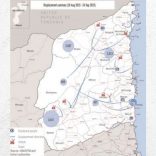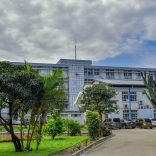Mozambique: Violence affecting civilians on track to reach record high in 2025, UN warns
“We have to invest in children’s talents, otherwise we will not have a future” – Rosalia Arteaga in Maputo

Former President of Ecuador Rosalia Arteaga is in Mozambique to attend MOZEFO, [Photo: O País]
“Education in the 21st Century” was the theme of the second panel on this first day of the MOZEFO conference. The first speaker was Rosália Arteaga, former president of Ecuador, who argued that the future would see the end of many traditional occupations. For this reason, Arteaga suggested, Mozambique and the world must develop children’s talents, otherwise there would be no future.
In Arteaga’s opinion, the role of human beings is to ensure that the use of science is beneficial to all, together with the values of honesty, equal opportunity and the fight against corruption, reconciling what the child learns at home and at school.
“We have to think about the human beings we want to build, combining the mix of global and local, which will give us the identity and tools the world needs,” Arteaga says, in accordance with her vision of the future as a balance between the young and those older.
And, because the future depends on investing in children, Arteaga says that Mozambique and underdeveloped countries need teachers with ability and knowledge.
For the speaker, the best schools are those that have the best teachers, leaders with high recognition and good salaries.
Daniel Traça, Director of the New School of Business & Economics was also on the panel. He was incisive: “We spend a lot of money on students at school, but we care too little about what they learn. Education, yes, but of quality. Education must be aligned with the country’s development strategy, integrating the various sectors of society.”
Traça recommended that there should be a clear strategy to accelerate development which is relevant to the global scenario and how Mozambique fits into it.
Traça is a proponent for the idea that Mozambique should align with development strategies that prepare people, because when this does not happen, the risk of population explosion is high. “Students must learn in schools, but also in business. We need to be pragmatic in the way we deal with education. It is also necessary to always look to the future, to think about the country 10 years from now,” he said.
Jorge Ferrão, Rector of UniMaputo, and former Minister of Education and Human Development, said education policies in Mozambique were kept up with population growth, but fatalistic views of education in Mozambique must nevertheless be extirpated.
“We are already starting to see good results at from our teaching, with students developing start-ups in Japan and South Korea. We need, as a country, to make the effort to make very affirmative decisions about education.”
By Jose dos Remedios












Leave a Reply
Be the First to Comment!
You must be logged in to post a comment.
You must be logged in to post a comment.